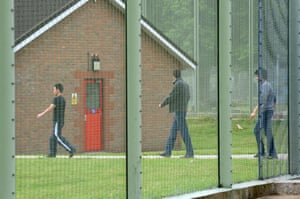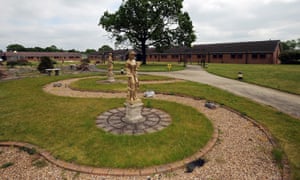A Vietnamese victim of child slavery has launched legal proceedings against the government after he was sexually assaulted at Morton Hall immigration removal centre, the Guardian can reveal.
The Home Office has admitted that the 19-year-old – known as H – was being detained illegally when he was attacked by another inmate, who attempted to rape him in his cell in 2016.
H had already been recognised as a potential victim of child trafficking at the time of the assault and the Home Office accepts that he should not have been subject to immigration detention.
After the assault, H continued to be held at Morton Hall for a further six months. Following interventions by law firm Duncan Lewis, the Home Office confirmed that H was a victim of modern slavery but refused to release him. It has continued to try to deport him back to Vietnam.
According to clinical psychologists who assessed H during his detention, he was left severely traumatised and fearing for his life after the assault, which triggered memories of earlier rapes and abuse he had suffered at the hands of his traffickers.
Morton Hall accepts that the assault took place, but did not launch an investigation into the attempted rape or provide any support to H after the attack. The centre began an internal enquiry into the attack only after being contacted by lawyers from Duncan Lewis, who threatened legal action.
H was trafficked from Vietnam to the UK at the age of 16 and was forced to tend cannabis plants in a house in Derbyshire. When the house was raided by police and H was found locked inside, he was charged with cannabis cultivation and eventually prosecuted and sent to a young offenders’ institution. He was transferred directly from incarceration to Morton Hall in Lincoln.

In a statement, H said: “My time in immigration detention was awful. After this incident, I was really paranoid that other detainees would hurt me all of the time. I felt scared all the time and I found it very difficult to sleep or eat. Morton Hall staff do not protect the detainees. Although terrible things have happened to me in the past, the effect of immigration detention made this even worse.”
Ahmed Aydeed, director at Duncan Lewis, said the assault formed part of a catastrophic failure on the behalf of the UK authorities in their duty of care to H.
“This is a vulnerable victim of slavery who was a child at the time of his exploitation – who was locked inside a cannabis house and then criminalised, incarcerated in a young offenders’ institution and then illegally detained in immigration detention where he suffered a highly traumatising assault, which was then never investigated,” he said. “Our client’s treatment undermines the government’s rhetoric on its commitment to protecting victims of slavery and its own guidance on how child trafficking victims should be supported. Is this really how we treat those who have experienced slavery in the UK?”
H has now launched a civil action against Morton Hall based on negligence and breach of its statutory duties under the Human Rights Act for failing to launch an internal investigation or refer the incident to the police.
Duncan Lewis has also begun a judicial review against the Home Office on behalf of H, asking for deportation proceedings to be halted and for the Home Office to admit systemic failings in the treatment of victims of slavery in the UK.
H says that when he was 16 years old he was lured from his rural village to Ho Chi Minh city by people he had met on Facebook and was brought to meet a group of men who said they could take him to Europe. When he declined, he was locked in a room, tortured, raped and forced into debt bondage. He says he was also beaten with electrified sticks and burned with heated rods. The men told him they would kill his family if he refused to go.
When he reached the UK, H was taken to a property used as a cannabis farm in Derbyshire and told to look after the plants, he says. He was deliberately starved and kept locked inside the house for weeks at a time.
Following a police raid on the property and H’s arrest by Derbyshire police, he was recognised as a potential victim of child trafficking by the Home Office. However, neither the police nor the Crown Prosecution Service (CPS) were informed of his status and he was later sentenced to eight months at a young offenders’ institution. While in detention the Home Office initiated deportation proceedings and H was taken directly to Morton Hall, where the sexual assault took place.

H is now in a safe house for victims of trafficking and has been released on bail from immigration detention. His application for discretionary leave to remain has been turned down. The appeal to have this decision reversed forms part of the judicial review against the Home Office.
H says he is too scared to return to Vietnam because his traffickers know where he lives and have threatened to harm him if he fails to repay money they spent to transport him from Vietnam to the UK. He says he has been unable to contact his parents, who have moved since he arrived in the UK.
The judicial review is due to be heard in the high court in May. The civil case against Morton Hall continues.
Vietnamese children were among the largest groups of slavery victims identified by the National Crime Agency (NCA) in 2017. Many like H, continue to be brought to the UK to work in cannabis farms.
Overall, the number of possible child victims identified by the NCA in 2017 grew by two-thirds compared with 2016. Almost half of the 5,145 cases reported – 41% – involved the possible exploitation of a child aged under 18.
Chloe Setter, head of advocacy, policy and campaigns at Ecpat UK (Every Child Protected Against Trafficking), said: “It is heartbreaking to see young people, often suffering from trauma after years of abuse, being wrongly criminalised, detained like prisoners or denied appropriate support. It is disturbing that the UK is identifying ever-higher numbers of trafficked children but often failing to provide the right protection to keep them safe.”
The Home Office said in a statement: “The UK has a proud history of granting asylum to those who need our protection and every case is assessed on its individual merits. As the appeal is ongoing it would not be appropriate to comment further.”